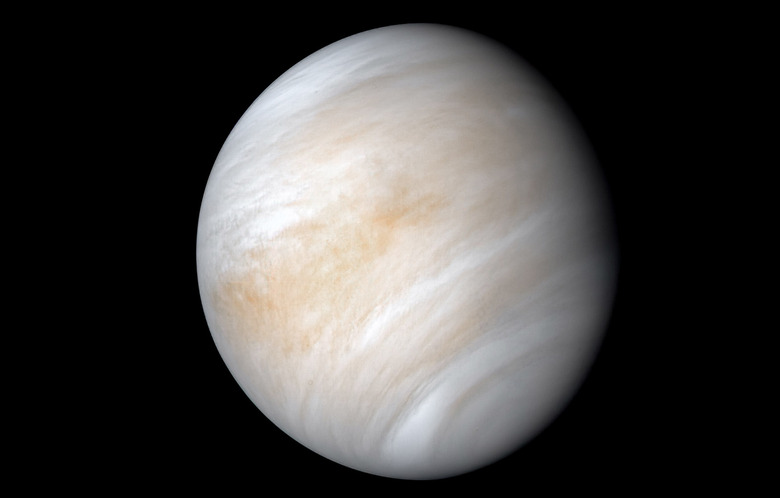Life On Venus? Jupiter May Have Made Venus Inhabitable
- New research suggests that Venus was once potentially habitable, but that likely changed when Jupiter swooped in and messed things up.
- Venus once had a much more elliptical orbit, allowing its surface to cool off for extended periods of time.
- When Jupiter pushed up closer to the Sun, it may have changed the orbit of Venus and caused it to remain scorching hot all the time.
There's been a lot of Venus in the news lately and for very good reason. Possible biosignatures were detected in the planet's atmosphere, hinting at the slim chance that life in some form exists on or above the planet's surface. But while we ponder what kind of life may exist there, researchers say that the planet probably had a good chance of being habitable if it weren't for Jupiter's influence.
In a new study published in the Planetary Science Journal, scientists from UC Riverside in California reveal that Jupiter likely played a big role in the current conditions we see on Venus. Had Jupiter not been involved, the planet might have ended up in a much more favorable location in our solar system.
Using computer models, the researchers suggest that Jupiter's movement during its very early formative period likely affected Venus in a dramatic way. Jupiter pushed up closer to the Sun and then backed away to roughly where it is today, over the course of many millions of years.
When that happened, its gravity influenced Venus in such a way that it pushed the planet into a nearly perfectly circular orbit around the Sun. That wasn't always the case, however, and it's likely that when Jupiter was closer to the Sun, Venus had a much more elliptical orbit, allowing it to escape the intense heat of the star for extended periods of time and, possibly, remain habitable for an untold period of time.
"One of the interesting things about the Venus of today is that its orbit is almost perfectly circular," Stephen Kane, lead author of the study, said in a statement. "With this project, I wanted to explore whether the orbit has always been circular and if not, what are the implications of that?"
"As Jupiter migrated, Venus would have gone through dramatic changes in climate, heating up then cooling off and increasingly losing its water into the atmosphere," Kane explains. It was during this rough period that Venus began to gradually turn into the hostile "hellscape" it is today.
As for the notion that Venus has life in some form on or around it, Kane isn't convinced. Hedging bets on the presence of phosphine gas to indicate life could backfire, as there are non-biological processes that can also create it. "There are probably a lot of other processes that could produce the gas that haven't yet been explored," Kane notes.
